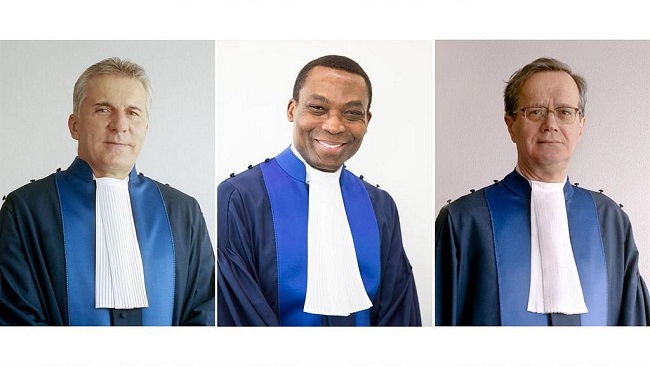Nigerian judge, Chile Eboe-Osuji elected new president of International Criminal Court
The judges of the International Criminal Court (ICC), sitting in a plenary session have elected Judge Chile Eboe-Osuji of Nigeria as President of the Court for a three-year term with immediate effect. Judge Robert Fremr from the Czech Republic was elected First Vice-President with Judge Marc Perrin de Brichambaut of France as Second Vice-President.
‘I am deeply honoured to have been elected by my peers as President of the International Criminal Court. As I take up my duties, I feel encouraged that I am able to rely on the wide experience of the two Vice-Presidents, Judge Robert Fremr and Judge Marc Perrin de Brichambaut, both of whom I have closely worked with previously. I look forward to working together with them as well as with all the judges, all the Officials and the staff of the Court in a spirit of collegiality.
I also look forward to collaborating with the Assembly of States Parties, civil society and the international community at large, acting together to strengthen and reinforce the Rome Statute system, the 20th anniversary of the adoption of which we celebrate this year’, President Chile Eboe-Osuji stated following the election.
Justice Chile Eboe-Osuji was born in Anara in Imo State, Nigeria, on September 2, 1962. He obtained his bachelor of laws degree from the University of Calabar, Nigeria. He obtained his master of laws degree from McGill University in Montreal, Canada, and doctor of laws degree from the University of Amsterdam, the Netherlands.
He was called to the Nigerian Bar in 1986 and practised briefly there. After achieving his Master’s degree from McGill in 1991, he worked as a barrister in Canada. From 1997 to 2005.
During his stay in Canada he worked as a barrister and law lecturer.
Judge Eboe-Osuji worked at the International Criminal Tribunal for Rwanda as prosecution counsel and senior legal officer to the judges of the tribunal. From 2005 to 2007.
Working for the Special Court for Sierra Leone as senior prosecution appeals counsel in 2007/08 and returning to the ICTR from 2008 to 2010 as Head of Chambers, he became the Legal Advisor to the United Nations High Commissioner for Human Rights in 2010.
He has authored two books and numerous law journal articles in international law. On 16 December 2011, he was elected as a judge of the International Criminal Court. He won the office in the fifteenth ballot in the Assembly of States Parties with 102 votes.
The Nigerian born judge in 2014 recused himself as a member of the bench that tried the case involving Kenyan President Uhuru Kenyatta who was standing trial with his vice William Ruto for crimes against humanity following the Kenya’s post election violence in 2007.
The work of the ICC Presidency:
The Presidency – consisting of the President and the two Vice-Presidents – plays a key role in providing strategic leadership to the ICC as a whole.
The Presidency coordinates with the other organs and seeks the concurrence of the Prosecutor on matters of mutual concern.
In accordance with the Rome Statute, the ICC’s governing treaty, the Presidency is responsible for the proper administration of the Court, with the exception of the Office of the Prosecutor.
The Presidency oversees the activities of the Registry and provides input into a broad range of administrative policies affecting the Court’s overall functioning.
Furthermore it conducts judicial review of certain decisions of the Registrar and concludes Court-wide cooperation agreements with States and international organizations.
Culled from Africa News





